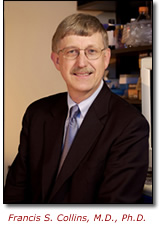Last updated: October 30, 2010
NHGRI Director to Receive International Ethics Prize
NHGRI Director to Receive International Ethics Prize
 In recognition of his continuing efforts to improve human health through genetic research and his support of ethical, legal and social implications analysis of genomic science, Francis S. Collins, M.D., Ph.D., director of the National Human Genome Research Institute (NHGRI), will be awarded the inaugural Inamori Ethics Prize this fall.
In recognition of his continuing efforts to improve human health through genetic research and his support of ethical, legal and social implications analysis of genomic science, Francis S. Collins, M.D., Ph.D., director of the National Human Genome Research Institute (NHGRI), will be awarded the inaugural Inamori Ethics Prize this fall.
The honor comes from the Inamori International Center for Ethics and Excellence at Case Western Reserve University, Cleveland. The center will present the award to Dr. Collins at a September 4 symposium at Case Western's Severance Hall, which will also feature a lecture by Dr. Collins.
"I applaud the Inamori Center's leadership in the field of ethics, which is a necessary complement to scientific research," said Dr. Collins. "With great knowledge comes great responsibility. The Inamori Ethics Prize is testament to that, and it is with immense gratitude that I accept this recognition."
Founded in July 2006, the Inamori Center at Case Western Reserve University is supported by a gift from Dr. Kazou Inamori, founder of Japan's Kyocera Corporation, an international firm supplying communications and electronic products and services, and the Inamori Foundation, Kyoto, Japan. The Inamori International Center for Ethics and Excellence works to foster ethical leadership by collaborating with people and entities from the regional to international level and by sponsoring research, symposia and scholarships. Its annual ethics prize is given to someone who dedicates him or herself to, in Dr. Inamori's words, "serve humankind through ethical deeds rather than actions based on self-interest and selfish desires."
"Developing criteria for the prize, we wanted to honor someone who reflects Dr. Inamori's values, someone who has conducted his life in an exemplary fashion and accomplished something of real benefit to humankind," said Gregory L. Eastwood, M.D., director of the Inamori Center. "Dr. Collins seemed to really fit both of those requirements very well."
As director of NHGRI, one of the 27 institutes and centers that make up the National Institutes of Health (NIH), Dr. Collins led the NIH component of the international Human Genome Project (HGP), which sequenced the human genetic blueprint. Many consider the effort, successfully completed in 2003, to be the most important scientific undertaking of our time.
In addition to his long list of contributions to scientific leadership and basic genetic research, Dr. Collins is known for his close attention to ethical, social and legal issues in genetics. Throughout the HGP and other projects that build upon its foundation, Dr. Collins has been a strong supporter of NHGRI's Ethical, Social and Legal Implications (ELSI) Research Program. The program has been a pioneer in fostering basic and applied research on the ethical, legal and social implications of genetic and genomic research for individuals, families and communities. Dr. Collins also has been a strong advocate for protecting the privacy of genetic information and has served as a national leader in efforts to make sure that genetic information is not used to discriminate against people in employment and health insurance.
In addition to his role as director of NHGRI, Dr. Collins heads a laboratory dedicated to researching both rare and common diseases. Throughout his career, his teams have made a number of important discoveries, including the genes responsible for cystic fibrosis, neurofibromatosis, Huntington's disease and Hutchinson-Gilford progeria syndrome, along with genetic variants associated with coronary artery disease and type 2 diabetes.
Dr. Collins received a B.S. from the University of Virginia, a Ph.D. in physical chemistry from Yale University, and an M.D. from the University of North Carolina. Following a fellowship in human genetics at Yale, Dr. Collins joined the faculty at the University of Michigan, where he remained until becoming NHGRI director in 1993.
